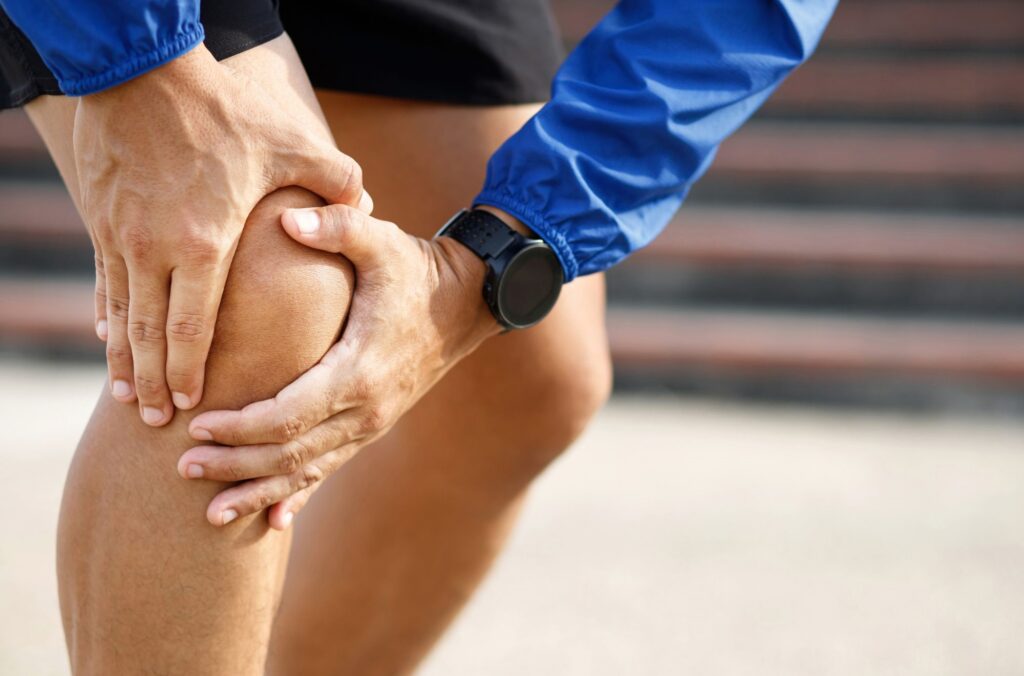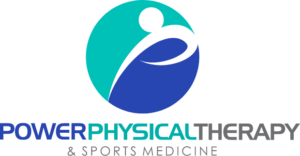4 Reasons You’re Experiencing Knee Pain After Running

Are you an athlete who loves to run, but finds that you’re experiencing knee pain after every event?
Whether you’re training for your next basketball game or for your latest soccer tournament, you’re not alone.
Knee pain is a common complaint among athletes, and it can really put a damper on your running performance when you’re trying to reach a new personal best or beat your competition on the basketball court.
In order to take control of your problem and prevent it in the future it is important to first understand the root cause of your knee pain. What could be going wrong before, after, or during your run that is causing your knee pain?
In this blog, we will discuss 4 reasons why you may be experiencing knee pain after running.
1 – Over-Training
Firstly are you pushing yourself too hard?
We really do understand how important it is for our patients to stay active and continue to train, especially with a marathon or sporting event on the horizon.
However, too much running can overwork your muscles and joints, leading to long-term damage if not addressed.
Without adequate resting time, your body will never be able to fully rest and repair.
Don’t you want to play your best and set new records?
Remember that as frustrating as it may sound, resting and allowing your body time to repair is just as important as training.
Resting doesn’t just mean sitting around on the couch all day and waiting for the pain to magically disappear.
There are things you can do to best prepare yourself for your next run, speaking of which.
2 – Weak Core Strength
A common misconception regarding knee pain is that it is all related to lower body issues, however, a strong core can reduce the tension on your knee joints, preventing further injury.
Your core and hips are part of a chain of muscles that help stabilize your body, including your knees. If your core and hip muscles are weak, other parts of this chain, like your knees, have to pick up the slack. This additional strain can lead to discomfort or even injury.
So, how can you address this? Strengthening exercises targeted at your core and hips can make a world of difference.
Planks, for example, are a powerful exercise that strengthens your entire core – the muscles in your abdominals, lower back, and pelvis. This helps improve overall stability and balance, reducing the load on your knees.
Side bridges, on the other hand, specifically target your oblique muscles and hips. These muscles play a crucial role in stabilizing your body, especially during movements that involve your legs.
By incorporating these exercises into your routine, you’re reducing tension on your knees, and setting yourself up for a more active, pain-free life.
So while taking a well needed rest from running to allow your knees time to repair, you can focus on strengthening your core.
3 – Poor Warm-Up / Warm Down
Warming up and stretching before each run is not just a good practice – it’s essential for preventing injuries and ensuring optimal performance.
If you skip this crucial step, you’re more likely to experience knee pain. But why is that?
When we start running without a warm-up, we’re suddenly demanding a lot from our bodies. Cold muscles and joints are less flexible and don’t absorb shock as well, which can put undue stress on your knees.
A proper warm-up gradually increases your body temperature, heart rate, and blood flow to the working muscles. This process prepares your muscles and joints for the physical stress of running by increasing their flexibility and responsiveness.
Stretching as part of your warm-up routine is also vital.
It enhances elasticity in the muscles, and ligaments, which helps combat tightness and soreness. Stretching your hamstrings, and calves can particularly help alleviate pressure on your knees.
So, next time you’re about to hit the pavement, take a few extra minutes to warm up and stretch.
Your knees will thank you!
4 – Existing Injury
Have you ever been injured, particularly around your knee area?
If so, it’s possible that your knee is still recovering, even if the pain isn’t always noticeable. It’s crucial to understand that healing from an injury is a process and requires careful attention to ensure a full recovery.
When we sustain an injury, our bodies initiate a healing process that can take weeks, months, or even years, depending on the severity of the damage. During this time, it’s crucial to offer your body the appropriate support to guarantee recovery!
Foam rolling can be another beneficial tool, it helps break down scar tissue and adhesions between skin, muscles, and bones. This can increase blood flow, relieve muscle tension, and enhance the range of motion in the knee joint.
Remember, patience is key when dealing with an injury. Gradual improvement is better than rushing and risking further damage.
It’s important to consult a physical therapist before starting any new fitness routine, especially if you’re recovering from an injury.
Looking For More Free Advice To Eliminate Knee Pain?
Are you interested in some quick ways to relieve your knee pain without spending lots of money on new equipment or treatment options?
Look no further!
We are currently offering a free report with 6 simple tips for eliminating knee pain.
This expert advice on how to treat your knee pain fast was written by founder and expert physical therapist, Mark Nowlin.
Get Your Free Report Just For You
Address Your Pain At The Root Cause
Too often, other treatment plans only target the symptoms of your pain rather than spending the time to find the root cause of your issue.
Have you met with a doctor or other healthcare professional for them to only spend five minutes assessing you, to then just offer medication, injections or even surgery to treat your pain?
Power Physical Therapy is different. Our team will spend time listening to your story and determining the source of your discomfort, so that we can not only reduce your symptoms but stop the pain at the root cause, preventing it from ever returning.
Lucky for you, we are currently offering a Free Knee Pain Consultation. This 1 on 1 assessment will give you the time to ask any questions you may have about physical therapy and put you on a fast track to recovering from your pain.
We know a lot of people are apprehensive about trying a new treatment, especially when they have tried other costly methods in the past. With our free knee pain consultation you have absolutely nothing to worry about, with nothing to lose but everything to gain, what are you waiting for?
We understand that you may find it difficult to find time in your busy schedule, so we also offer a Free Telephone Consultation.
Speak to our specialists and get personalized advice without leaving your house.
Other Free Advice To Help With Your Pain
Read our blog – Ready To Overcome Your Hip And Knee Pains? and 5 Reasons You Need To Start Stretching More Often
Follow us on social media – Like Us On Facebook
